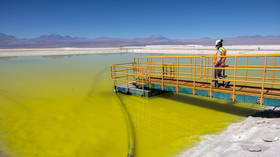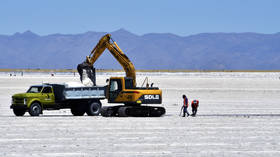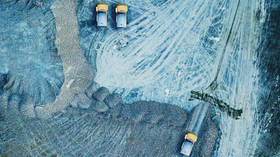The battle for lithium: China plants its shovel in the US’ back yard

Lithium is the essential mineral for renewable energy resources, and is gearing up to become to the 21st century what coal was to the previous two centuries.
The mineral is the key material in producing lithium-ion batteries, which power everything from mobile phones to electric cars. More importantly, it is deemed to be a “pillar for the fossil-fuel free economy” by the United Nations, seen as the primary way to store energy in the clean power grids of the future. As such, lithium has become one of the most sought-after commodities with its price surging by over 500% in the past two years.
Geopolitical currents are driving a scramble for the precious mineral by world powers. There’s a fight over who controls supply chains, started by the US, which has rejected globalization and is seeking to reassert its influence over critical global goods by forcibly re-shoring them and undermining competitors (a key aspect of its approach towards Russia and China).
With its dominant position over renewable energy goods and technologies, China has become the focus of the Biden administration's efforts to regain a lead in the industry. Washington’s more competitive posture has seen the two countries at odds over who can locate and exploit lithium deposits around the planet. Whoever controls the supply chain will dominate the industry.
The supply chain begins where the resource in question is found. On this, China has a head start, possessing both a significant amount of lithium and the ability to mine it. It ranks sixth in the world for overall lithium resources (5.1 million tons) and fourth in mineable reserves (1.5 million tons). The US itself has more lithium resources with 9.1 million tons, but its current mineable reserves stand at only 750,000 tons. Resources in this case relate to known deposits of lithium whereas mineable reserves are those that are already being extracted and utilized.
While having Australia on its side, with its 5.7 million tons of lithium reserves, could help shift the balance in its favor, it seems the US is losing its grip on a region that is rich in lithium deposits and also one Washington has dominated for decades if not centuries: Central and South America. Meanwhile, China is making significant advances in these key regions.
Latin America alone possesses 56% of the world’s Lithium deposits. These are concentrated in Bolivia, Argentina, Chile (the ‘lithium triangle’), and Brazil. Bolivia’s 21 million tons are practically untapped, and while Argentina exploits 2.2 million of its 19 million tons of overall resources, there’s obviously room to grow. In addition, Mexico also has 1.7 million tons. Now, the US and China are competing for access to this vast supply.
Traditionally, the US has claimed hegemony over the Americas through its Monroe Doctrine policy, which is intended to prevent the emergence of any other competing power in the region. In order to maintain this dominance, Washington has waged centuries worth of wars and engineered regime change and coups in Latin American countries, the most recent effort being the unsuccessful attempt to remove Nicholas Maduro from Venezuela (which itself had to do with oil).
As the geopolitical and economic rivalry between the US and China heats up, Beijing has sought to invest in many lithium ventures across the Americas. The US has responded by leveraging political power where it can. There have been efforts to block a Chinese company from exploring lithium in Mexico, and Canada recently ordered three Chinese firms to divest from its mineral companies citing matters of national security. Both of these countries are parties to the USMCA - United States - Mexico - Canada Agreement, and with China gone, their lithium mines will be more open to American investment.
Washington’s efforts have not been successful in every instance. The number one country for Lithium reserves, Bolivia, is not a US-friendly country and leans far to the left politically. As such, several weeks ago a Chinese consortium secured a deal in La Paz that gives it the right to develop two lithium plants. The Chinese company will invest over $1 billion into the first stage of the project.
The US also faces challenges in Argentina and Brazil, with both countries rejecting the Monroe Doctrine and seeking to secure their interests in a more multipolar environment. With the defeat of Jair Bolsonaro and the return of left-wing Luiz Inacio “Lula” da Silva, it seems obvious that Brazil will pitch itself as part of a multipolar environment and seek engagement with China, discarding the Sinophobic, pro-US streak embraced by his predecessor. A year ago, Argentina joined China’s Belt and Road initiative, and in July last year a Chinese company completed a near $1 billion deal to take over of an Argentinian Lithium firm, something the US was not able to block.
Geopolitical tensions are heating up as fast as an overstressed lithium battery. A future full of electric cars and renewable, clean energy may be coming, but climate issues and the future of humanity are not the driving force here. Shared global interests are dogged by the politics of which country should get to manufacture these electric cars, and which country should control the supply chains to make them. The US has a problem with China getting ahead, which is creating a new showdown in the Americas.
The statements, views and opinions expressed in this column are solely those of the author and do not necessarily represent those of RT.














